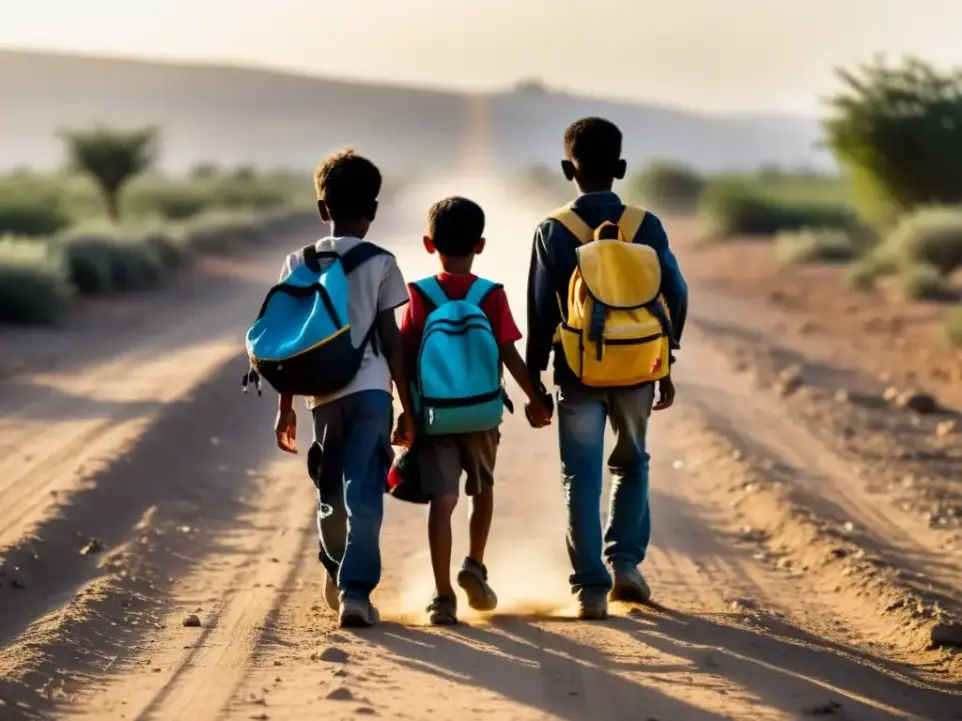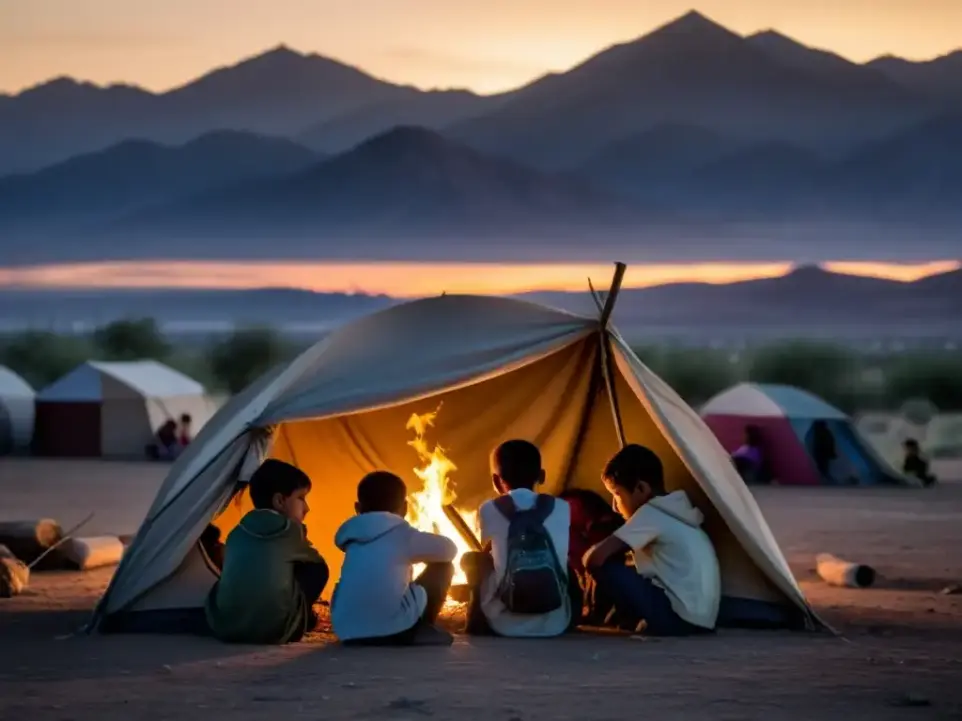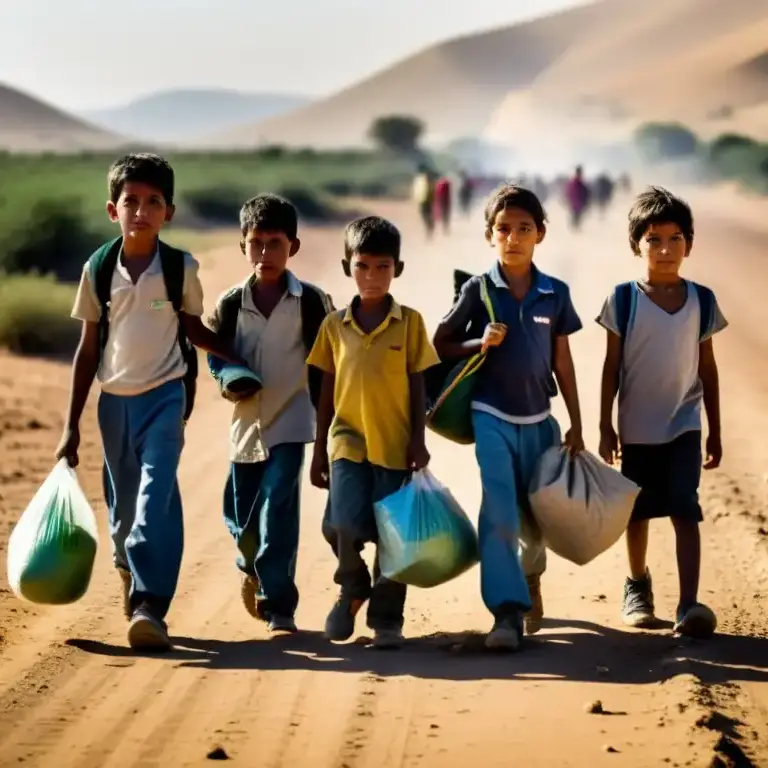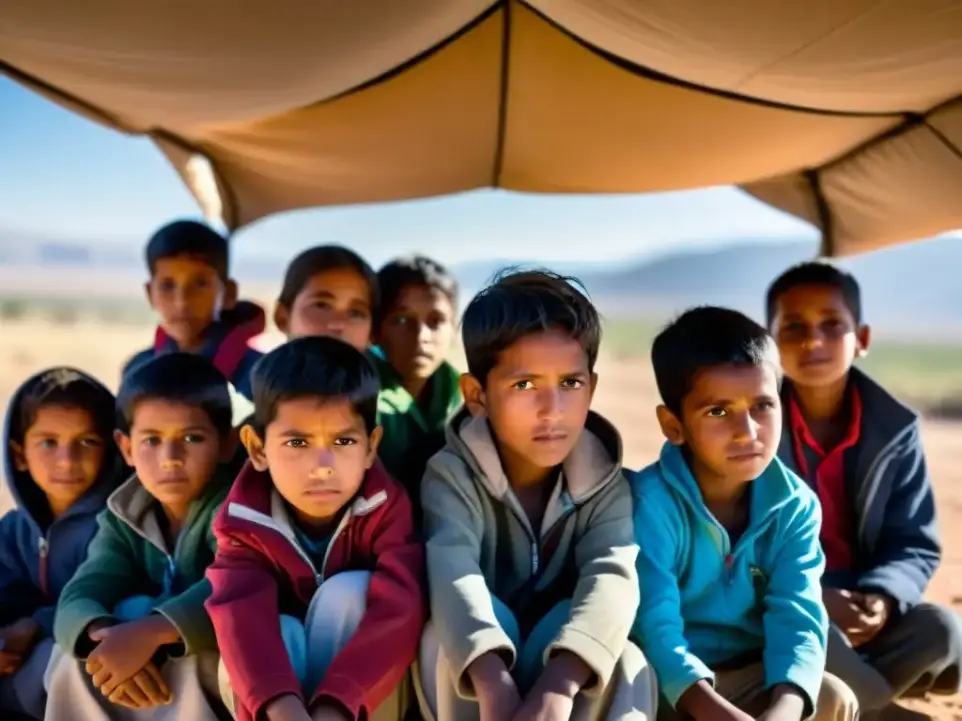Fleeing to survive: The odyssey of unaccompanied migrant children




Dive into our in-depth exploration and analysis of global human rights. In our feature article, “Fleeing to Survive: The Odyssey of Unaccompanied Migrant Children,” we unravel the shocking reality of migrant children and their struggle for survival. Join us to discover more about this crucial issue and delve deeper into defending the rights of vulnerable groups. The odyssey is just beginning!
Table of Contents
1- Introduction
The journey of unaccompanied migrant children
Impact of migration on children's human rights
Global context of child migration
2 - Odyssey of unaccompanied migrant children: Challenges and challenges
Experiences during the journey
Exploitation and abuse
Access to protection and assistance
Impact on mental and emotional health
3 - Human rights and protection of unaccompanied migrant children
International standards for the protection of the rights of migrant children
Access to education and health services
Ensuring a safe and welcoming environment
Challenges in the implementation of rights protection
4 - Global and regional response to unaccompanied child migration
Protection policies and programmes
International cooperation in the protection of unaccompanied migrant children
Challenges and opportunities in humanitarian response
Impact of migration on host communities
5 - Conclusion
Actions needed to protect the rights of unaccompanied migrant children
The role of HumanDefenders in promoting the human rights of unaccompanied migrant children
Future challenges in protecting the rights of unaccompanied migrant children
6 - Frequently asked questions
1. What human rights are involved in the odyssey of unaccompanied migrant children?
2. What are the main challenges faced by migrant children during their journey?
3. What measures are being taken to protect the rights of migrant children?
4. How can individuals contribute to improving the situation of migrant children?
5. What is the long-term impact of the odyssey of migrant children on their lives?
7 - Final reflection: The journey of unaccompanied migrant children
- 1- Introduction
- 2 - Odyssey of unaccompanied migrant children: Challenges and challenges
- 3 - Human rights and protection of unaccompanied migrant children
- 4 - Global and regional response to unaccompanied child migration
- 5 - Conclusion
- 6 - Frequently asked questions
- 7 - Final reflection: The journey of unaccompanied migrant children
Child migration is a complex phenomenon affecting millions of children around the world. The journey of unaccompanied migrant children is a harrowing experience that puts their physical and emotional well-being and fundamental rights at risk. They face significant obstacles as they seek safety and opportunities in a new country, triggering profound impacts on their daily lives.
Unaccompanied migrant children, also known as “unaccompanied children,” are forced to flee their homes due to armed conflict, violence, extreme poverty or persecution. This odyssey represents one of the most harrowing realities in the global human rights landscape.
In this context, it is critical to understand the impact of migration on children’s human rights, as well as the global context surrounding this issue, in order to advocate for effective solutions that protect and guarantee the fundamental rights of these vulnerable children.
The journey of unaccompanied migrant children
The journey of unaccompanied migrant children is a grueling and dangerous experience. Many of them embark on long and risky journeys, facing dangers such as human trafficking, violence, exploitation and abuse. The lack of resources and adequate support during their journey exposes them to situations of extreme vulnerability, leaving deep scars on their physical and emotional well-being.
Uncertainty, fear and anguish are constant companions on the path of these children, who are often forced to separate from their families in search of a safer future. This odyssey, marked by loneliness and desperation, represents an overwhelming challenge for these young people, whose lives are deeply affected by the difficulties and risks associated with migration.
It is crucial to provide protection and support to these children during their journey, as well as to guarantee their access to health care, education and psychological counseling services to mitigate the negative impacts of this traumatic experience.
Impact of migration on children's human rights
Migration has a significant impact on children's human rights, undermining their access to education, health, protection and comprehensive development. Exposure to hostile environments and risky situations during the journey and in destination countries can leave these children vulnerable to labour exploitation, recruitment by armed groups, human trafficking and other forms of abuse.
In addition, the lack of legal documentation and the discrimination they face in receiving countries can limit their access to essential services and the protection necessary for their well-being. This represents a clear violation of their fundamental rights, requiring coordinated responses at the international level to ensure their protection and promote their inclusion in host communities.
It is imperative that governments, international organisations and society as a whole work together to establish policies and programmes that protect and guarantee the rights of migrant children, recognising their vulnerability and responding to their needs in a comprehensive and humanitarian manner.
Global context of child migration
Child migration is a global phenomenon affecting countries in all regions, with significant numbers of migrant children coming from Latin America, Africa, Asia and the Middle East. Factors such as poverty, violence, natural disasters and lack of economic opportunities drive numerous children to undertake dangerous journeys in search of safety and hope for a better future.
The complexity of child migration requires comprehensive and coordinated responses at the global level, which address the underlying causes of this phenomenon and promote sustainable solutions that protect the rights of migrant children and provide support to their families in their countries of origin. This global perspective is essential to understand the magnitude of the problem and to advocate for effective policies that address the needs of migrant children around the world.
It is essential to raise public awareness about the reality of child migration and to promote solidarity and empathy towards these vulnerable children. The protection of their human rights must be an absolute priority on the international agenda, in order to guarantee a dignified and safe future for all unaccompanied migrant children around the world.
The journey of unaccompanied migrant children is an experience full of challenges and dangers. During their journey, they face extremely difficult situations that put their physical and emotional integrity at risk. The lack of protection and ignorance of their rights expose them to multiple situations of vulnerability, making their journey a true odyssey.
Unaccompanied migrant children face precarious conditions during their journey, often traveling long distances on foot, in adverse weather conditions and with limited resources. Many of them are victims of exploitation and abuse, which further aggravates their situation and highlights the urgent need to provide them with protection and assistance.
It is essential to understand the experiences these children face during their journey in order to develop effective strategies to guarantee their well-being and protection.
Experiences during the journey
Unaccompanied migrant children are often forced to cross unknown territories, facing a lack of food, drinking water and shelter. Uncertainty and fear are constant companions on their journey, and exposure to human trafficking networks and criminal groups increases the risk of exploitation and abuse.
The loneliness and vulnerability of these children make them especially prone to falling prey to unscrupulous traffickers and criminals, which worsens their situation and exposes them to extremely dangerous situations. It is crucial to address these experiences during the journey in order to understand the magnitude of the challenges they face and to establish effective measures for their protection.
The odyssey of unaccompanied migrant children is a reality that demands urgent attention and concrete actions to guarantee their safety and well-being.
Exploitation and abuse
The journey of unaccompanied migrant children is marked by the constant threat of exploitation and abuse. Many of them are subject to human trafficking, forced labour and other forms of exploitation, which generates a devastating impact on their physical and emotional health.
The lack of protection and vulnerability of these children makes them easy targets for those who seek to profit from their situation. It is essential to address this reality with the seriousness it deserves, establishing effective protection mechanisms and providing comprehensive assistance to unaccompanied migrant children to prevent and respond to situations of exploitation and abuse.
Combating the exploitation and abuse of unaccompanied migrant children is a moral and legal imperative that demands a comprehensive and coordinated approach to ensure their protection and well-being.
Access to protection and assistance
Access to protection and assistance is a crucial element in the odyssey of unaccompanied migrant children. Ensuring that these children receive adequate protection, emotional and psychological support, as well as legal and social assistance is fundamental to their long-term recovery and well-being.
Effective identification, referral and specialized care systems need to be put in place to ensure that unaccompanied migrant children receive the protection and support they need. Furthermore, it is essential to strengthen international cooperation and coordination between the different actors involved in protecting the rights of unaccompanied migrant children, in order to ensure a comprehensive and effective response to their needs.
Access to protection and assistance is a fundamental right of unaccompanied migrant children, and its full realization requires a firm commitment by the international community and States, as well as an approach based on the human rights and dignity of each child.
Impact on mental and emotional health
The odyssey of unaccompanied migrant children has a significant impact on their mental and emotional health. These children face a number of challenges that can lead to long-lasting psychological trauma. Exposure to violence, separation from their families, uncertainty about their future and precarious conditions during their journey can cause anxiety, depression and post-traumatic stress in many of them. Lack of emotional support and feelings of helplessness can further aggravate their emotional state, making attention to their mental health crucial.
Furthermore, the stigmatization and discrimination they face in their destination country can negatively affect their emotional well-being. Difficulty adapting to an unfamiliar environment, different language and customs, as well as the pressure to integrate quickly, can lead to feelings of loneliness, rejection and alienation. All of this contributes to the emotional vulnerability of migrant children, requiring specialized interventions to address their psychological and emotional needs.
It is critical that governments, organizations and society at large recognize the impact on the mental and emotional health of unaccompanied migrant children and develop programs and policies that provide psychological support, access to mental health services and integration strategies that promote their emotional well-being and enable them to recover from the traumatic experiences lived during their migration odyssey.
International standards for the protection of the rights of unaccompanied migrant children
The protection of the rights of unaccompanied migrant children is supported by several international standards, such as the UN Convention on the Rights of the Child, which states that States must ensure the protection and care of unaccompanied migrant children, regardless of their immigration status. Likewise, the UN Convention relating to the Status of Refugees recognises that children have the right to seek asylum and to enjoy the same rights as adult refugees. These international standards seek to protect unaccompanied migrant children, ensuring that their fundamental rights are respected, regardless of their immigration status.
In addition, the Declaration of the Rights of the Child, adopted by the UN General Assembly, states that children have the right to receive special protection and assistance, including the necessary protection and care both before and after birth. These provisions highlight the importance of ensuring the protection and well-being of unaccompanied migrant children, recognising their fundamental rights as human beings in a migration context.
In this regard, international regulations for the protection of the rights of migrant children establish a legal framework that seeks to guarantee their well-being, safety and protection, regardless of their immigration status or legal status in a country.
Access to education and health services
Access to education and health services is essential to guarantee the well-being of unaccompanied migrant children. Education not only gives them the opportunity to develop intellectually, but also provides them with tools to integrate into the host society and build a promising future. On the other hand, access to adequate health services is essential to ensure their physical and emotional well-being.
In many cases, unaccompanied migrant children face barriers to accessing education and health services, whether due to their immigration status, language barriers or lack of resources. It is the responsibility of States and the international community to ensure that these children have access to quality education and adequate health services, without discrimination.
Lack of access to education and health services can exacerbate the vulnerability of unaccompanied migrant children, leaving them at a disadvantage. It is therefore essential that concrete measures are taken to ensure that they can access these fundamental rights, ensuring their comprehensive development and their right to a dignified life.
Ensuring a safe and welcoming environment
Unaccompanied migrant children need a safe and welcoming environment that provides them with protection and emotional support during their journey and at their destination. It is essential that measures are put in place to ensure their safety and well-being, preventing them from becoming victims of abuse, exploitation or human trafficking.
In addition, it is necessary to promote the creation of welcoming environments that promote the integration of unaccompanied migrant children into the host society, providing them with psychosocial support and facilitating their integration into the community. The creation of support programmes, raising awareness among the local population and promoting cultural diversity are key aspects to ensure that these children can develop in an environment that respects and values their identity and rights.
Ensuring a safe and welcoming environment for unaccompanied migrant children is essential to protect their well-being and promote their integration into the host society. This requires commitment at both the governmental and community levels to ensure that these children receive the necessary support to thrive in their new environment.
Challenges in the implementation of rights protection
The protection of the rights of unaccompanied migrant children faces a number of significant challenges in its implementation. One of the main challenges is the lack of coordination between countries of origin, transit and destination. The complexity of immigration laws and bureaucratic procedures often make it difficult to identify and adequately protect these children at every stage of their journey. This can result in gaps in protection, exposing migrant children to situations of risk and vulnerability.
Another major challenge is the lack of resources and capacities to provide adequate care and protection to unaccompanied migrant children. Many countries lack specialized facilities and trained personnel to address the specific needs of these children, which can lead to inadequate or insufficient care. In addition, the lack of funding for human rights assistance and protection programs further hampers the ability of countries to effectively address the situation of unaccompanied migrant children.
Furthermore, xenophobia and discrimination towards migrants, especially children, represent a significant challenge in the protection of their human rights. Stigmatization of migrants often hinders their access to basic services and legal protection, putting their well-being and safety at risk. Overcoming these prejudices and promoting a culture of respect and solidarity towards migrants is essential to ensure effective protection of the rights of unaccompanied migrant children around the world.
Protection policies and programs
The protection of unaccompanied migrant children is a highly relevant issue on the international agenda. Various countries and organizations have implemented specific policies and programs to address this issue. These initiatives seek to ensure respect for the human rights of migrant children, as well as their safety and well-being during the migration process.
Protection policies often include measures to prevent human trafficking, labor and sexual exploitation, as well as to ensure access to education, health and other basic needs of migrant children. Family reunification is also promoted and protocols are established for the identification and care of unaccompanied children at borders and other points of entry.
Protection programs, for their part, usually offer legal assistance, psychosocial support, temporary accommodation and access to health care and education services. These programs are designed to provide a safe and welcoming environment for migrant children, as well as to facilitate their integration in destination countries or to manage their return in cases of deportation.
International cooperation in the protection of unaccompanied migrant children
The protection of unaccompanied migrant children requires strong international cooperation. Given the transnational nature of migration, it is essential that countries work together to ensure the protection of the rights of these children, as well as to address the underlying causes of migration.
International cooperation in this area involves the coordination of policies and actions between countries of origin, transit and destination of migrant children. It also involves the exchange of information, good practices and resources to strengthen protection systems and improve the capacity to respond to the migration of unaccompanied children.
International organizations, such as the UN and the European Union, play a crucial role in promoting international cooperation for the protection of unaccompanied migrant children. These entities facilitate dialogue between States, provide technical and financial assistance, and promote compliance with international human rights standards in relation to child migration.
Challenges and opportunities in humanitarian response
The humanitarian response to unaccompanied child migration faces various challenges, but also presents opportunities to improve the protection and well-being of these children. One of the main challenges lies in the early identification of unaccompanied migrant children, as well as in ensuring their access to adequate protection and assistance services.
In addition, the humanitarian response must comprehensively address the specific needs of migrant children, considering aspects such as their age, gender, health status and previous experiences. It is also essential to involve host communities and raise awareness of the rights and needs of unaccompanied migrant children.
Despite the challenges, the humanitarian response offers opportunities to promote inclusion, solidarity and respect for diversity. It also offers the possibility of strengthening child protection systems and generating positive changes in the lives of migrant children, thus contributing to the promotion of human rights at a global level.
Impact of migration on host communities
Migration of unaccompanied children has a significant impact on host communities, both socially and economically. These communities often face challenges in terms of resources and services to meet the needs of migrant children. The integration of these children into the education and health system can represent an additional burden for host communities, requiring a coordinated and supportive response from local authorities and society at large.
Furthermore, the migration of unaccompanied children can generate tensions in host communities, as some residents may perceive migrants as competition in the labour market or as a burden on social services. These perceptions can contribute to the stigmatisation and discrimination of migrant children, which in turn affects their emotional well-being and their ability to fully integrate into their new communities.
It is essential to implement psychosocial support programmes for both migrant children and host communities, in order to foster empathy, understanding and solidarity. It is also necessary to promote initiatives that facilitate the integration of migrant children into host communities, recognising and valuing their potential contributions to society as a whole.
Actions needed to protect the rights of unaccompanied migrant children
Protecting the rights of unaccompanied migrant children is a responsibility that falls on the international community. Coordinated action between countries of origin, transit and destination is required to address this humanitarian challenge. It is essential to establish protection protocols that guarantee the safety and well-being of these children at all stages of their journey. In addition, policies must be implemented that address the underlying causes of migration, providing support to communities of origin and promoting safe alternatives for those forced to flee.
It is also crucial to improve reception and care systems in destination countries, ensuring that migrant children receive the legal, medical and psychological assistance they need. This implies greater cooperation between government authorities, international organizations and NGOs, as well as strengthening mechanisms for monitoring and protecting the rights of unaccompanied migrant children.
Effective implementation of these actions will require sustained commitment and significant resources, but is essential to ensure that unaccompanied migrant children are treated with dignity and respect, and that they have the opportunity to reach their full potential despite the difficult circumstances in which they find themselves.
Future challenges in protecting the rights of unaccompanied migrant children
Despite efforts made, the protection of the rights of unaccompanied migrant children continues to face significant challenges. Lack of coordination between countries, criminalization of irregular migration and negative rhetoric around migration represent obstacles to ensuring the safety and well-being of these children.
In addition, the COVID-19 pandemic has further exacerbated the vulnerability of unaccompanied migrant children, limiting their access to essential services and exposing them to increased risk of exploitation and abuse. The need for urgent measures to protect these children in the context of the pandemic is pressing, and requires a holistic approach that addresses both the immediate consequences and the underlying causes of their situation.
In this regard, it is essential that the international community strengthens its commitment to protecting the rights of unaccompanied migrant children, comprehensively addressing the current and future challenges they face. Only through a collaborative, human rights-based approach can we ensure that these children receive the protection and support they deserve, allowing them to rebuild their lives with dignity and hope.
1. What human rights are involved in the odyssey of unaccompanied migrant children?
In the odyssey of unaccompanied migrant children, fundamental rights such as the right to protection, integrity and well-being are involved.
2. What are the main challenges faced by migrant children during their journey?
The main challenges faced by migrant children include exploitation, violence and lack of access to basic services such as health and education.
3. What measures are being taken to protect the rights of migrant children?
Protection and legal assistance programmes are being implemented to guarantee the rights of migrant children, as well as efforts to prevent human trafficking and violence.
4. How can people contribute to improving the situation of migrant children?
People can contribute through donations to organisations that support migrant children, volunteering in related projects and disseminating information to raise awareness about the situation.
5. What is the long-term impact of the odyssey of migrant children on their lives?
The ordeal of migrant children can have a lasting impact on their emotional well-being and development, as well as on their integration into host societies.
The odyssey of unaccompanied migrant children is more relevant than ever in today's landscape of migration and human rights.
The fight to protect these children continues to resonate in our collective conscience, reminding us that humanity must prevail over borders. "Migrant children represent the future of humanity, and we must ensure that they are treated with dignity and respect on their journey to a better future," said one human rights advocate.
It is time to reflect on how each of us can contribute to creating a more compassionate and welcoming world for unaccompanied migrant children. Their odyssey challenges us to act with empathy and solidarity, reminding us that protecting their rights is everyone's responsibility.
